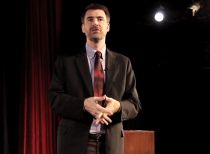Keynote Speeches
The world is changing fast. Demographic shifts are turning everything we know about the global economy on its ear, while shale energy is undoing decades of dependencies. The immutable rules of geography are breaking down our longstanding global free trade system. And it is all happening at the same time. What will this new world look like, exactly? With a mix of analysis and wit, Zeihan maps out the future from any number of viewpoints — government, corporate, financial, domestic and foreign — so audiences can make plans for a now more understandable future.
Presidents come and go, but geography doesn’t change. Gain understanding of the world the incoming Trump administration is inheriting, and get a glimpse into how the new White House will grapple with crises imminent, opportunities golden and everything in between.
SUPERSIZE ME: THE FUTURE OF GLOBAL ENERGY
Five recessions in nine years. A litany of debt debacles. Ossified institutions incapable of change. Rising populism. Refugee floods. Russians growling at the border. And that’s the good news. Despite a decade of crisis none of Europe’s problems have had their root causes addressed, and now time is simply up. Everything that makes modern, wealthy, cosmopolitan, democratic Europe possible is breaking apart, and the Europeans are about to lose far more than “merely” a decade. Discover what makes Europe tick, what is tearing it down, and most of all, what is next.
Three pillars support modern China’s success: global trade, internal political unity, and easy money. With those three pillars, China has managed to shake 2000 years of war and occupation and remake itself as one of the world’s most powerful countries. Yet none of these three pillars can stand without American assistance, and that cooperation is ending. China’s “inevitable” rise isn’t simply over, it is about to go into screeching, unrelenting, dismembering reverse. But that’s hardly the end of history. When a country falls — particularly the world’s top manufacturing power — the ripples affect countries and industries near and far. Learn who benefits and who loses in a world without China.
Modern agricultural patterns are the result of three largely unrelated factors: low-risk global trade, insatiable Asian demand, and unlimited cheap credit. Within the next five years, all three of these trends will not just evaporate, but invert. When that happens, the only thing that will hurt more than the gradual loss of demand will be the sudden collapse of supply. However, none of this impacts the American producer – it therefore will be the United States that will reap the benefits of its productivity and stability for decades to come.
As the global system evolves no country is better positioned than Canada. Very soon Canada’s choices will be about how to take advantage of opportunities, rather than how to avoid complications. But in this very silver lining is a very dark cloud. The same evolutions that will allow Canada unprecedented opportunities for wealth and respect also hold the possibility of damaging the Canadian state. This time the dangers do not originate from the United States, but from within Canada itself. And they could very well prove mortal.
View more of Peter’s presentations here.

















Similar Speakers 123